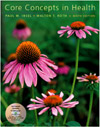Paul M. Insel,
Stanford University School of Medicine
Walton T. Roth,
Stanford University School of Medicine
| drug | Any chemical other than food intended to affect the structure or function of the body.
|
 |
 |
 |
| psychoactive drug | A drug that can alter a person's consciousness or experience.
|
 |
 |
 |
| intoxication | The state of being mentally affected by a chemical (literally, a state of being poisoned).
|
 |
 |
 |
| addictive behavior | Any habit that has gotten out of control, resulting in a negative effect on one's health.
|
 |
 |
 |
| substance abuse | A maladaptive pattern of use of any substance that persists despite adverse social, psychological, or medical consequences. The pattern may be intermittent, with or without tolerance and physical dependence.
|
 |
 |
 |
| physical dependence | The result of physiological adaptation that occurs in response to the frequent presence of a drug; typically associated with tolerance and withdrawal.
|
 |
 |
 |
| substance dependence | A cluster of cognitive, behavioral, and physiological symptoms that occur in an individual who continues to use a substance despite suffering significant substance-related problems, leading to significant impairment or distress; also known as addiction.
|
 |
 |
 |
| tolerance | Lower sensitivity to a drug so that a given dose no longer exerts the usual effect and larger doses are needed.
|
 |
 |
 |
| withdrawal | Physical and psychological symptoms that follow the interrupted use of a drug on which a user is physically dependent; symptoms may be mild or life-threatening.
|
 |
 |
 |
| dual disorder | The presence of two or more mental disorders simultaneously in the same person; for example, drug dependence and depression.
|
 |
 |
 |
| *pharmacological properties | The overall effects of a drug on a person's behavior, psychology, and chemistry.
|
 |
 |
 |
| dose-response function | The relationship between the amount of a drug taken and the intensity or type of the resulting effect.
|
 |
 |
 |
| time-action function | The relationship between the time elapsed since a drug was taken and the intensity of its effect.
|
 |
 |
 |
| placebo effect | A response to an inert or innocuous medication given in place of an active drug.
|
 |
 |
 |
| high | The subjectively pleasing effects of a drug, usually felt quite soon after the drug is taken.
|
 |
 |
 |
| opioid | Any of several natural or synthetic drugs that relieve pain and cause drowsiness and/or euphoria; examples are opium, morphine, and heroin; also called narcotic.
|
 |
 |
 |
| euphoria | An exaggerated feeling of well-being.
|
 |
 |
 |
| depressant or sedative-hypnotic | A drug that decreases nervous or muscular activity, causing drowsiness or sleep.
|
 |
 |
 |
| central nervous system | The brain and spinal cord.
|
 |
 |
 |
| sedation | The induction of a calm, relaxed, often sleepy state.
|
 |
 |
 |
| tranquilizer | A CNS depressant that reduces tension and anxiety.
|
 |
 |
 |
| anesthetic | A drug that produces a loss of sensation with or without a loss of consciousness.
|
 |
 |
 |
| stimulant | A drug that increases nervous or muscular activity.
|
 |
 |
 |
| state dependence | A situation in which information learned in a drug-induced state is difficult to recall when the effect of the drug wears off.
|
 |
 |
 |
| psychosis | A severe mental disorder characterized by a distortion of reality; symptoms might include delusions or hallucinations.
|
 |
 |
 |
| depersonalization | A state in which a person loses the sense of his or her own reality or perceives his or her own body as unreal.
|
 |
 |
 |
| hallucinogen | Any of several drugs that alter perception, feelings, or thoughts; examples are LSD, mescaline, and PCP.
|
 |
 |
 |
| synesthesia | A condition in which a stimulus evokes not only the sensation appropriate to it but also another sensation of a different character; for example, when a color evokes a specific smell.
|
 |
 |
 |
| altered states of consciousness | Profound changes in mood, thinking, and perception.
|
 |
 |
 |
| flashback | A perceptual distortion or bizarre thought that recurs after the chemical effects of a drug have worn off.
|
 |
 |
 |
| proprioception | The sensation of body position and movement, from muscles, joints, and skin.
|
 |
 |
 |
| codependency | A relationship in which a non-substance-abusing partner or family member enables the other's substance abuse.
|



 2002 McGraw-Hill Higher Education
2002 McGraw-Hill Higher Education